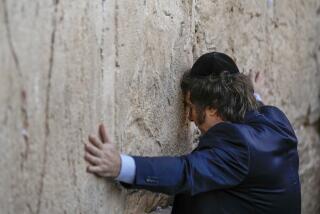22 Acquitted in 1994 Bombing in Argentina
- Share via
BUENOS AIRES — An Argentine judicial panel Thursday acquitted all 22 defendants charged in the 1994 bombing of a Jewish community center here, ending a three-year trial rife with irregularities and leaving unanswered the question of who was behind the worst act of anti-Semitic violence on Latin American soil.
The chief defendants were four Buenos Aires provincial police officers and a mechanic linked to the explosives-laden van that destroyed the seven-story Argentine-Israelite Mutual Assn., killing more than 80 people.
The verdict takes the investigation back to the days after the attack, when the van was traced to mechanic Carlos Telleldin, leading to his arrest.
A variety of leads have since suggested the involvement of Iranian officials and an international terrorist cell in Buenos Aires. The three-judge panel trying the defendants called Thursday for an investigation of Juan Jose Galeano, the judge originally assigned to the case, and of two key officials in the government of former President Carlos Menem: Interior Minister Carlos Corach and intelligence chief Hugo Anzorreguy.
The panel said there was evidence that the judge and the officials had conspired to frame the police officers.
“This is not justice,” said Laura Ginsberg of Active Memory, a group of victims’ relatives. “The court has just set free the only defendants we had in the death of our loved ones. This is the result of a 10-year cover-up and three years of a fraudulent trial,” said Ginsberg, whose husband was killed in the bombing.
The trial -- the longest in Argentine history -- started to fall apart soon after it began in late 2001.
In March 2002, Telleldin said that Galeano had arranged a secret $400,000 payment to him in exchange for testifying that officers of the notoriously corrupt Buenos Aires provincial police had purchased the van from him and were the masterminds of the bombing. It was later revealed that agents of Argentina’s state intelligence service had paid Telleldin at Galeano’s request.
Legal observers agree that Galeano and his investigative team transformed the case into a judicial farce.
“Ten years have passed,” Buenos Aires Rabbi Daniel Goldman wrote as the case wound to a close. “And we have been witness to the complicity between the state and a lie, between the intelligence service and shameful bureaucrats, between anti-Semites and fainthearted judges.”
Under the justice system used in much of South America, judges both investigate and decide cases. Under Galeano’s supervision of the case, key evidence was lost, destroyed or stolen, including the secretly recorded phone calls of Telleldin and other suspects.
Galeano was removed from the case in December.
“It would have been infinitely worse if someone had been convicted without any evidence,” said Andrea Pochak, an attorney who monitored the trial for the Center for Legal and Social Studies, the nation’s leading human rights group.
Still, the trial failed in its central mission: determining who was responsible.
“In general terms, the facts we now know about the bombing were known within a week of the attack,” Pochak said. Instead, the trial has uncovered the crime that occurred after the bombing, “the vast number of lies that were told over the course of 10 years of investigation.”
Allegations of irregularities have been made against Menem. He was president at the time and the case languished until he left office in 1999. He now faces arrest on a variety of unrelated corruption charges should he return from exile in Chile.
Since taking office in 2003, President Nestor Kirchner has moved to reform the judiciary.
On Wednesday, Adolfo Vazquez became the latest Supreme Court judge linked to Menem to resign rather than face an impeachment vote in the Senate.
A man identified as “Witness C” linked Menem to the cover-up of the 1994 bombing. The man, an Iranian intelligence official, told investigators that the Iranian government paid Menem $10 million to keep Argentine authorities from uncovering Tehran’s alleged role in the bombing.
Other leads have pointed to South American-based Islamic militants and the group Hezbollah.
In the days before the July 1994 bombing of the Jewish center, Brazilian Wilson Dos Santos told Argentine diplomats in Milan that an Iranian terrorist cell was planning an attack on a central Buenos Aires building whose description matched that of the Jewish center.
He also told them that the cell had carried out the 1992 bombing of the Israeli Embassy in Argentina -- a case that also remains unsolved.
In recent months, a federal unit created by Kirchner to investigate the two bombings has reopened a line of inquiry centered on two men: Samuel Salman El Reda, a Colombian of Lebanese descent, and Mohsen Rabbani, once Iran’s cultural attache in Buenos Aires.
On Thursday, attorneys for the accused repeated an argument they had made throughout the case. “This verdict proves there was no local connection in this case,” said Victor Stinfale, an attorney for Telleldin.
Times staff writer Andres D’Alessandro in Buenos Aires contributed to this report.
More to Read
Sign up for Essential California
The most important California stories and recommendations in your inbox every morning.
You may occasionally receive promotional content from the Los Angeles Times.














